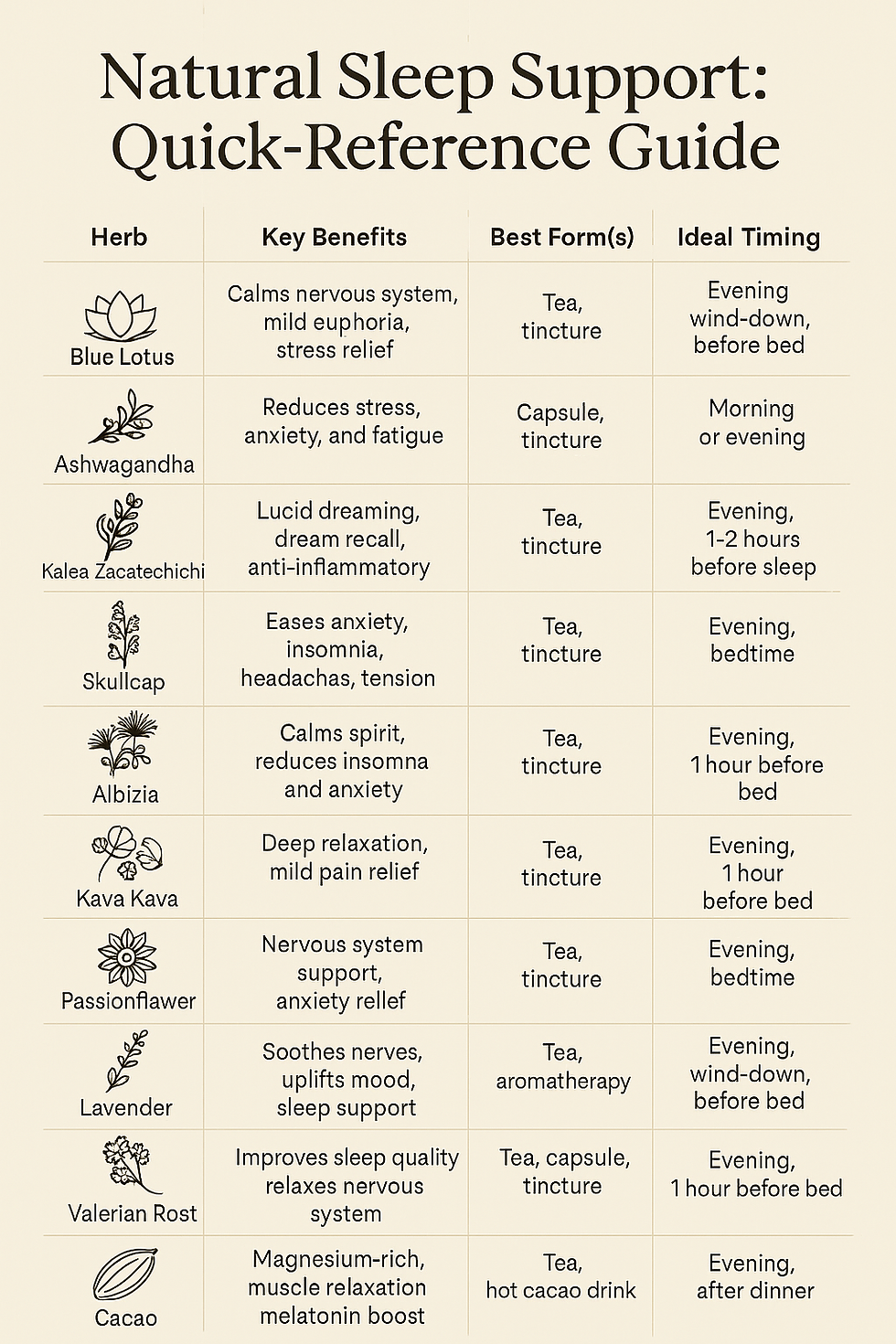Exploring Sleep Challenges and 10 Natural Alternatives to Sleeping Pills
- radiantheartbrooma
- Aug 24, 2025
- 4 min read

Have you ever found yourself staring at the ceiling at 2 a.m., wishing you could just switch off your mind? Maybe it was after a stressful day, or maybe it’s been happening night after night, leaving you exhausted before the day even begins.
Whatever your relationship with sleep has been-occasional struggle or ongoing battle-you’re not alone. So many of us carry the weight of the day into the night. Our bodies crave rest, but our minds and hearts often have other plans.
What I’ve learned over the years, both personally and through teaching yoga and herbalism, is that sleep issues rarely come from one place. They can be emotional, spiritual, physical, or simply circumstantial, and often, it’s a mix of everything at once. Let’s gently explore some of the reasons sleep can feel so elusive, and then I’ll share my favorite natural allies for a deeper, more peaceful night’s rest.
The Psycho-Spiritual Side of Sleeplessness
Sometimes, the reason we can’t sleep has little to do with our bodies and everything to do with our inner world.
An Overactive Nervous System
When the nervous system stays “on,” the body never gets the signal to soften and release. That’s why creating a simple evening ritual like gentle stretching, breathwork, journaling, or sipping a calming tea can help you shift from alertness into surrender.
Your Organ Clock
Traditional Chinese Medicine teaches that each organ has its own time on the body’s clock, with both physical and emotional meaning.
11pm–1am: Gallbladder | Linked to decision-making and confidence.
1am–3am: Liver | Often holds unresolved anger and the weight of toxins.
3am–5am: Lungs | Connected to grief and the life force of the breath itself.
5am–7am: Large Intestine | A place of letting go, physically and emotionally.
Waking at the same time every night can be your body’s way of whispering what it needs.
Unprocessed Emotions and Spiritual Awakenings
Sleepless nights can be invitations—sometimes to release old pain, sometimes to prepare for something new unfolding in your life. If you feel like you’re on the edge of change, consider practices like lucid dreaming, altar offerings, or simply journaling to help you receive the messages waiting for you.
The Physical Side of Sleeplessness
Other times, the body itself is struggling.
Toxins and Digestion
Environmental toxins, poor diet, and sluggish digestion can all throw off our sleep cycles. The gut and brain are deeply connected, so a stressed-out digestive system often equals a restless mind.
Hormones and Stress
An overactive thyroid, chronic stress, and irregular cortisol rhythms can all interfere with the body’s natural ability to rest.
The Pineal Gland
This tiny gland in the brain regulates melatonin and our circadian rhythm. Stress, toxicity, and irregular sleep patterns can throw it off balance, while sunlight exposure, meditation, and evening rituals help it stay healthy and aligned.
Life Circumstances and the Weight We Carry
Sometimes sleep disappears because life feels heavy. A big move. A relationship ending. A stressful job. Worrying about the future or the past.
Even exciting transitions, like new beginnings, can keep the nervous system buzzing. If this is you, be gentle. These seasons don’t last forever, and your body will rest again. Creating safe ways to process emotions like yoga, breathwork, therapy, or spiritual practices helps the body release what it’s been holding.
Sleep Syncing: A Natural Reset
One of the simplest but most powerful tools I’ve found for better rest is sleep syncing—aligning your bedtime and wake-up times with your body’s natural rhythms.
Set a consistent sleep schedule even on weekends.
Create a wind-down ritual to signal safety and rest to your body.
Limit stimulants like caffeine or alcohol in the evening.
Make your bedroom a sanctuary that is dark, cool, quiet, and cozy.
When we honor our body’s natural timing, we stop fighting against it and start flowing with it.
10 Natural Alternatives to Sleeping Pills
Instead of reaching for prescription sleep aids, consider these herbal allies that have been trusted for centuries to support relaxation and rest:

Ashwagandha restores balance, reduces anxiety, and helps the body handle stress.
Kalea Zacatechichi known as the dream herb, supports lucid dreaming and deep rest.
Skullcap relaxes tension in the body and soothes frazzled nerves.
Albizia called the tree of happiness, often used for calming the heart and mind.
Kava Kava brings deep relaxation and mild pain relief, perfect for unwinding.
Passionflower relieves anxiety, relaxes the nervous system, and supports peaceful sleep.
Lavender reduces agitation and promotes a sense of calm and comfort.
Valerian Root one of the most studied natural sleep remedies, known for improving sleep quality.
Cacao rich in magnesium, the sleep mineral, helps muscles release tension and supports melatonin production.
A Final Reflection
If sleep has been hard to come by lately, I hope this helps you feel less alone and more hopeful. Your body is wise. It always wants to return to balance, and sometimes sleeplessness is just its way of saying, “I need something to shift.”
Try adding one or two of these practices or herbs into your evening routine. Over time, the nights often begin to soften, dreams return, and rest comes easier.
Because sleep isn’t just about closing your eyes—it’s about feeling safe enough to surrender.



Comments